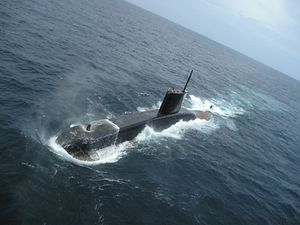German defense contractor ThyssenKrupp Marine Systems (TKMS) signed a $ 38.4 million contract for the modernization of two out of four Shishumar-class (Type 209/1500) diesel-electric attack submarines in service with the Indian Navy on June 29, according to Indian media reports.
The four 1,450-ton Shishumar-class SSKs form the Indian Navy’s 10th submarine squadron based in Mumbai. Two Shishumar-class submarines were assembled at the Howaldtswerke-Deutsche Werft (HDW) at Kiel in Germany, while the third and fourth vessels of the class were license-built at Mumbai’s Mazagon Dock Shipbuilders Limited and commissioned in the early 1990s.
The upgrade of the two license-built SSKs, aimed at extending their operational life by ten years, will also take place in Mumbai, according to a TKMS press release. TKMS’s contract with the Indian Navy entails fitting the boats with a new weapons suite–Boeing anti-ship UGM-84L Harpoon Block encapsulated missile systems.
In detail, the new weapons package includes 12 UGM-84L Harpoon Block II Encapsulated Missiles, 10 UTM-84L Harpoon Encapsulated Training missiles, and two Encapsulated Harpoon certification training vehicles. TKMS will also offer training to support and operate the new weapon system.
The upgrades will likely only take place on the latest two license-built Shishummar-class vessels due to technical limitations. “Only these two (Shalki and Shankul) can be done because certain modifications to the firing chain for missile launch need to be incorporated, which in a ‘fitted for’ configurations had already been catered for. Only the impulse flasks etc need to be added in the firing chain as the torpedoes are in swim out mode,” an Indian Navy official told local media.
“It is a key milestone in our long-standing commitment towards India. We have the capacity to integrate any weapon system that is selected by the Indian Navy, onto our submarines. We are happy to take on this project to now integrate the harpoon missiles in two of the four SSK submarines ” Gurnad Sodhi, Managing Director of ThyssenKrupp Marine Systems India, said.
TKMS is also competing for a contract to build six new diesel-electric submarines for the Indian Navy. As I reported previously (“Germany Offers India New Stealth Submarines”), TKMS has pitched the 2,000-ton (submerged) diesel-electric Type 214 submarines fitted with an air-independent propulsion system using Siemens polymer electrolyte membrane (PEM) hydrogen fuel cells.
As I noted elsewhere:
The Indian government has been deliberating over the purchase of six additional stealth submarines, capable of attacking land targets and equipped with AIP, since 2008 and is expected to make a decision by the year’s end (in a previous deal, India already opted for the purchase of six French Scorpene-class diesel-electric attack submarines the first of which was floated out in April 2015).
According to the original Project 75-I proposal, two submarines would have been be directly bought from one selected foreign shipyard with the remaining four build in India. Now, with the Modi government’s ‘Make in India’ program, all six vessels are to be built in India.
Germany’s competition in the bid will be fierce and will include DCNS (France), Navantia (Spain), Kockums (Sweden), Rubin Design Bureau-Amur Shipyard (Russia), Mitsubishi Heavy Industries and Kawasaki Heavy Industries (Japan). TKMS has already exported variants of the HDW Type 214 to Greece, South Korea, and Portugal.
TKMS’s Gurnad Sodhi said that his company would be ready to integrate indigenously-developed submarine-launched BrahMos supersonic cruise missiles onto the Type 214 submarines.
“We fully support the ‘Make and Made in India’ policy which would encompass inter-alia Transfer of Technology (ToT), training and meeting all offset obligations. We are awaiting the government’s decision on the Strategic Partner chapter of the new DPP [Defense Procurement Procedure] 2016, after which we will begin our negotiations with an Indian shipyard for the P75(I)”, Sodhi said.

































